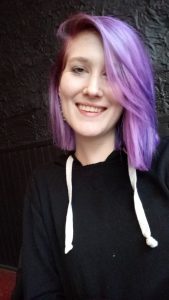Samantha Shockley

Transcript and interview available in Appendix 1.
Jamie Peterson was born and raised in a small town. I chose her because she’s my best friend. I feel that the interview broadened my perspective of her community and helped me to be able to connect with her. I think that because we are friends and because we have had previous conversations in the past about the LGBTQ+ community that the interview did not feel forced and it flowed with ease. Jamie herself has been quite an active person within the LGBTQ+ community of Liberty, Indiana. Jamie was there when the very 1st LGBTQ+ Club at Union County High School was assembled. She was the 1st Vice President of the LGBTQ+ Club at Union County High School then the preceding year she became the second President of the club.
Jamie has been through situations that have demonstrated the lack of acceptance by the general populace in society. I believe she was able to offer some real insight into the lives of people in the gay community surrounding Richmond, Indiana. Jamie is well informed in the LGBTQ+ Community so I feel she has authority and credibility (ethos) in the subject, especially with her position and involvement in a pretty impactful event. However, she also has stated to me on multiple occasions that “just because I’m gay doesn’t mean I speak for every gay.” I admire her a lot and because of this I think she was the best person to interview.
Jamie offers a lot of amazing insight in to her community, I can’t even begin to cover it all.
When asking the interview questions, I jumped right into the interview without asking ice breaker questions. I wanted to ask questions that I felt would best showcase the problems that could arise with creating a club in an Indiana high school and questions that would help the reader be able to get to know Jamie as well. Questions like “What are the stereotypes associated with your sexual orientation that you absolutely hate or find annoying?” I’ve noticed that people put queer woman into a stereotypical box. Just like any other sexual orientation there are many stereotypes behind the title. I want to get her view, her opinion on stereotypes that are associated to her. Through this I can see how Jamie views herself as an individual and separated from these stereotypes that she is often put in.
I am happy to say that I learned a lot more about Jamie and that am happy hearing about her opinions and about her past. This interview taught me about her place in the LGBTQ+ community and about the TV show Queer Eye.
As mentioned before, Jamie grew up in a predominately ‘country’ like setting, small- often close minded-town. Her parents are together and very supportive of their only child. In a high school where being different often made you a target of ridicule, she was different. Ignorance was often the driving force of the ‘hate.’ In many instances, a negative connotation follows ignorance, so I’d like to clarify that I’m using it in the sense that there is a lack of knowledge and information when it comes to certain subjects. With this comes the fear of the unknown.
When the LGBTQ+ club was created at her high school it was a step in the direction of educating people on an important matter at hand. Sadly, the new club didn’t receive such a warm welcome. Before the club was welcomed by the school they first had to go through a council. Jamie believes that the only reason they were able to go through is because “that was back when it was very common for news organizations to pick it up.” Saying, “oh, look at this small-town America and how backwards it is.” She then added, saying the club passed “because the school was afraid that was going to happen. It wasn’t for representation or they were nice. It was because they were afraid.”
Even then, once the club was accepted they still faced backlash. The club posters were ripped from the walls “continuously” and a couple teachers turned away from the club without a word. However, when some people saw a failure Jamie and the club saw exigence. They made the posters “brighter” and “put them everywhere.” This was Jamie’s idea.
This club occurred because the LGBTQ+ people in the school saw a need to have a place where people could gather and be in a nonjudgmental environment. The club itself didn’t last long but according to Jamie it made a lasting impact.
The experience Jamie had at her high school is sadly common in high schools across Indiana.
However, this is one interview compared to hundreds, if not, thousands of people so this can’t be used to see how the entirety of Richmond and surrounding areas are doing with the LGBTQ+ community. Because this is only one interview this excludes other sexual orientations than herself and transsexuals as well as people of color or of other nationalities. However, just because it’s one interview doesn’t mean it makes it any less important. Contextually, this interview will represent a time where society is becoming more knowledgeable on the LGBTQ+ community and its people. This will represent a time where social media and the internet play a large part in society’s ability to know about the different groups of people that weren’t always accurately portrayed. This is important because through the use of interviews we can help create a more educated public, with this comes less ignorance, less hate, and less fear of a community that doesn’t need to be feared nor hated.

